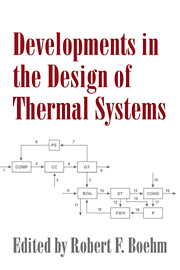Book contents
- Frontmatter
- Contents
- Preface
- Biographical sketches of the authors
- 1 Introduction and trends in the thermal design field
- 2 Computer-aided process design trends in the power industry
- 3 Automated design of chemical process plants
- 4 Thermophysical properties for design simulations
- 5 Introduction to Pinch Analysis
- 6 Second Law applications in thermal system design
- 7 Thermodynamic optimization of heat transfer and fluid flow processes
- 8 An introduction of thermoeconomics
- 9 Artificial intelligence in thermal systems design: concepts and applications
- Subject Index
- Author Index
5 - Introduction to Pinch Analysis
Published online by Cambridge University Press: 23 September 2009
- Frontmatter
- Contents
- Preface
- Biographical sketches of the authors
- 1 Introduction and trends in the thermal design field
- 2 Computer-aided process design trends in the power industry
- 3 Automated design of chemical process plants
- 4 Thermophysical properties for design simulations
- 5 Introduction to Pinch Analysis
- 6 Second Law applications in thermal system design
- 7 Thermodynamic optimization of heat transfer and fluid flow processes
- 8 An introduction of thermoeconomics
- 9 Artificial intelligence in thermal systems design: concepts and applications
- Subject Index
- Author Index
Summary
Introduction
In today's industrial practice, many plants are suffering from process designs that were completed in times when energy conservation and pollution prevention were not yet key issues. Such plants were built with little regard for reuse of utilities such as heat or water, because these came at low cost and could easily be discharged. Recently, however, environmental protection policies and the awareness that resources for heat and water are limited have led to considerable efforts in the fields of process design and process integration.
In a wide range of industries, Pinch Analysis is accepted as the method of choice for identifying medium- and long-term energy conservation opportunities. It first attracted industrial interest in the 1970s, against the background of rising oil prices. An engineering approach, but one incorporating scientific rigor, Pinch Analysis quantified the potential for reducing energy consumption through improved heat integration by design of improved heat-exchanger networks. Since then, Pinch Analysis has broadened its coverage to include reaction and separation systems in individual processes as well as entire production complexes. Today's techniques assess quickly the capital and operating-cost implications of design options that reduce intrinsic energy consumption, determine the potential for capacity debottlenecking, improve operation flexibility, and, most recently, quantify the scope for reduced combustion-related emissions. In addition, the same basic concepts have been extended to mass-transfer problems to give similar insights into waste minimization, with significant environmental implications.
In this chapter, the fundamentals and some extensions of Pinch Analysis are briefly reviewed.
Information
- Type
- Chapter
- Information
- Developments in the Design of Thermal Systems , pp. 122 - 138Publisher: Cambridge University PressPrint publication year: 1997
Accessibility standard: Unknown
Why this information is here
This section outlines the accessibility features of this content - including support for screen readers, full keyboard navigation and high-contrast display options. This may not be relevant for you.Accessibility Information
- 15
- Cited by
